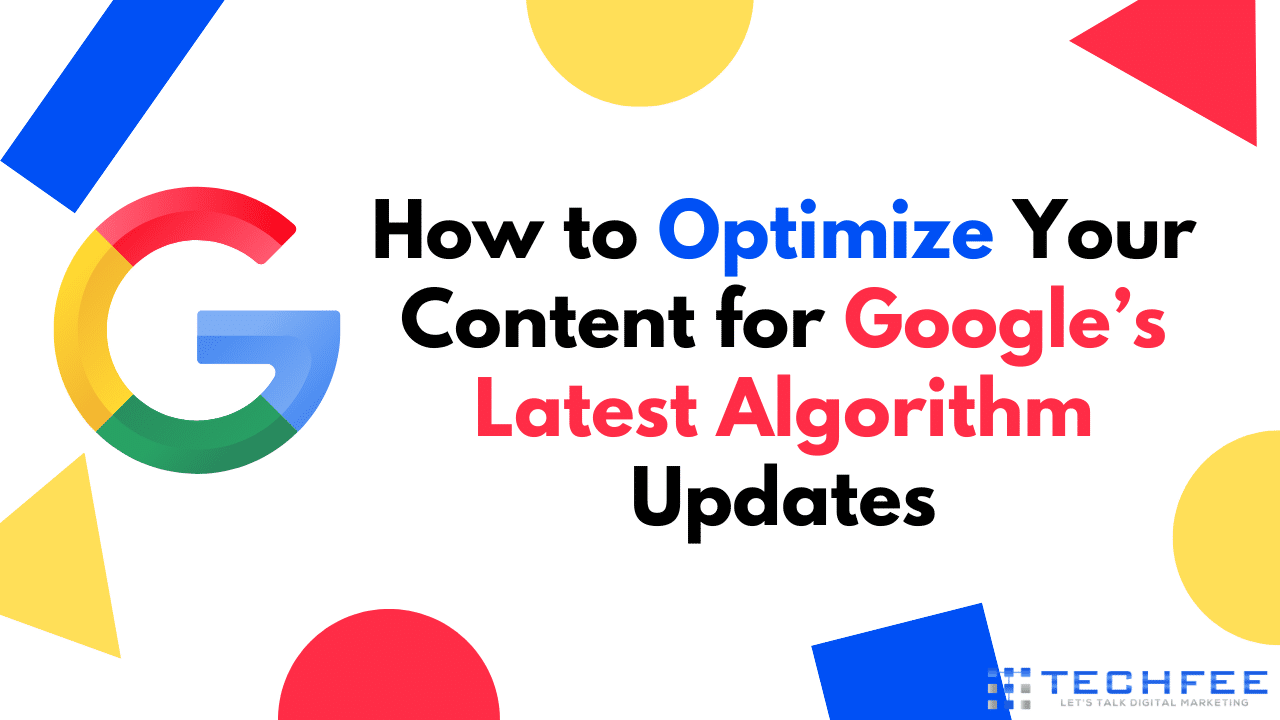Google’s algorithms continually develop to enhance user experience and promote high-quality, pertinent content to the forefront of search engine results.
To enhance your content for Google’s recent algorithm update, concentrate on creating unique and top-notch articles that achieve better rankings.
Enhance mobile adaptability and website speed while optimizing user experience through straightforward navigation.
Utilize relevant, contextual keywords, establish quality links, and leverage Google Analytics alongside other tools to monitor performance as it evolves and enhances over time.
Partnering with a marketing agency can help you effectively implement these strategies and stay ahead of algorithm changes.
Strategies to Optimize Your Content for Google’s Latest Algorithm Update
Here are some strategies for optimization:
Focus on High-Quality Content
Content is king. Google likes content that is original, informative, and engaging. The following are some ways to make your content Google-approved:
Write original and well-researched content.
Don’t stuff keywords; use natural language instead.
Keep your content current with the most recent information.
Use easy-to-understand language.
Focus on E-E-A-T (Experience, Expertise, Authoritativeness, Trustworthiness)
Google puts great emphasis on E-E-A-T factors when assessing content quality. To improve these factors:
Publish first-hand experiences, case studies, and primary research to illustrate hands-on knowledge.
Emphasize your content producers’ skills and credentials to demonstrate domain-specific expertise.
Earn backlinks from trustworthy websites and participate in industry forums to establish authority
Ensure that your site website has explicit contact details, privacy policies, and secure connections (HTTPS)
Improve Website Speed and Performance
Page speed is an essential ranking factor on Google. It may drive high bounce rates and have a reverse effect on ranking. To increase the website speed:
Optimize video and image files.
Make use of the content delivery network (CDN).
Reduce HTTP requests and implement browser caching.
Invest in a reliable, high-performance hosting provider that performs well.
Optimize for Mobile Friendliness
Thanks to the advancement of mobile queries, Google encourages websites to have a mobile-optimized version. To make your website responsive, use:
Test your site using Google’s Mobile-Friendly Test tool.
Make buttons and links easily clickable.
Enhance mobile page loading speed.
Improve User Experience (UX)
Google aims to deliver the best experience to users. You can achieve this by:
Designing easy navigation.
Employing an understandable and readable font.
Splitting content into brief paragraphs with subheadings.
Preventing intrusive pop-ups.
Utilize Relevant Keywords Naturally
Keywords make it easy for Google to know what your content is about. Nevertheless, they have to be used properly:
Conduct keyword research using tools such as Google Keyword Planner.
Insert keywords in titles, meta descriptions, headings, and content organically.
Make use of long-tail keywords to drive targeted traffic.
Use semantic SEO by employing relevant keywords and phrases.
Build High-Quality Backlinks
Backlinks from authoritative websites assist in boosting your rankings. A few efficient means of acquiring quality backlinks are:
Guest blogging on high-authority websites.
Developing shareable and useful content.
Reaching out to influencers in your space.
List your site to relevant directories.
Optimize On-Page SEO Elements
On-page SEO contributes significantly to rankings. Optimize your page by:
Creating engaging title tags and meta descriptions.
Header tags (H1, H2, H3) organize content.
Inserting internal links to related pages.
Including descriptive alt text on images.
Leverage Video and Visual Content
Google prefers more and more multimedia-featured content. To make your content visually attractive:
Utilize relevant images, infographics, and videos.
SEO optimizes videos with titles and descriptions.
Ensure images have alt tags and are compressed for faster loading.
Enhance Local SEO (If Applicable)
If your business is local, local search optimization is a must:
Optimize and claim your Google My Business listing.
Utilize local keywords and location-targeted content.
Incentivize reviews and respond to them.
List in local directories.
Monitor Analytics and Adapt
Google’s algorithm always changes, so monitoring your website’s performance is essential. Utilize tools such as:
Google Analytics to observe traffic and user behavior.
Google Search Console to verify indexing and repair errors.
SEO tools such as Ahrefs or SEMrush to monitor ranking and backlinks.
Google's Recent Algorithm Updates
Google regularly updates its search algorithm to enhance user satisfaction and provide more pertinent results. Here are a few key updates from 2023 through 2025:
August 2023 Core Update: This upgrade aimed to improve content quality by rewarding sites with original, interesting information, which improved their ranks.
September 2023 Helpful Content Update: Targeted content mainly produced for search engine rankings instead of user value, lowering such content in search results.
October 2023 Spam Update: Google has improved its capacity to identify and penalize spammy content, providing better-quality search results.
March 2024 Core Update: Incorporated the Helpful Content Updates into the core algorithm to tackle low-quality content and prioritize authoritative content.
AI Overviews Introduction (May 2024): Rolled out AI-created summaries within search results, giving users the information in the short form right inside the search environment.
Gemini AI Integration (October 2024): Introduced Gemini AI models that organize search outcomes while highlighting diverse content types like videos and forums.
Personalized Search Improvements (December 2024): Explored new features aimed at tackling intricate searches, suggesting a move towards a more user-centric and personalized search experience in 2025.
Conclusion
Enhancing your content for Google’s most recent algorithm changes involves producing original, high-quality articles that prioritize user experience, emphasize E-E-A-T elements, boost website speed, and guarantee mobile compatibility. Keeping track of your website’s performance through tools such as Google Analytics and staying informed about changes in Google’s algorithms will assist you in sustaining and enhancing your rankings in search outcomes.









